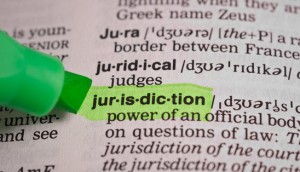How Much is too Much? Counsel’s Active Conduct in Asbestos Suit Results in Forfeiture of Jurisdictional Defense
June 9, 2016
News and Views on Environmental & Toxic Tort Federal and State Legal Issues and Developments
June 9, 2016
Since the  U.S. Supreme Court handed down Daimler AG v. Bauman 134 S.Ct. 746 (2014), personal jurisdiction defenses have experienced a renaissance in asbestos litigation. Defendants that wish to win such arguments, however, are well advised to heed a recent ruling by Judge Gibney, who presides over Rhode Island’s state court asbestos docket. In Bazor v. Abex Corporation et al., C.A. No. PC-10-3965 (R.I. Super. May 2, 2016), Judge Gibney issued a ruling that is instructive on what a defendant must do to preserve its right to contest jurisdiction, holding that a defense counsel’s “active conduct constitute[d] forfeiture of the defense of lack of personal jurisdiction.” The court referred to “forfeiture” as opposed to “waiver” because the defendant had properly asserted the lack of personal jurisdiction as a special defense.
U.S. Supreme Court handed down Daimler AG v. Bauman 134 S.Ct. 746 (2014), personal jurisdiction defenses have experienced a renaissance in asbestos litigation. Defendants that wish to win such arguments, however, are well advised to heed a recent ruling by Judge Gibney, who presides over Rhode Island’s state court asbestos docket. In Bazor v. Abex Corporation et al., C.A. No. PC-10-3965 (R.I. Super. May 2, 2016), Judge Gibney issued a ruling that is instructive on what a defendant must do to preserve its right to contest jurisdiction, holding that a defense counsel’s “active conduct constitute[d] forfeiture of the defense of lack of personal jurisdiction.” The court referred to “forfeiture” as opposed to “waiver” because the defendant had properly asserted the lack of personal jurisdiction as a special defense.
In this instance, the “active participation” included the following conduct during the two years and nine months between the filing of an answer and the motion to dismiss: filing an objection to the trial date, attending a plaintiff’s deposition, requesting and participating in the reopening of that deposition, participating in the deposition of the plaintiffs’ expert, objecting to the expert’s deposition on non-jurisdictional grounds, disclosing eight expert witnesses, filing 15 motions in limine, supplementing its expert witness disclosure, producing two expert witnesses for depositions, responding to discovery (without preserving the defense of lack of personal jurisdiction), supplementing its expert discovery, moving to compel the production of the plaintiffs’ bankruptcy trust documents, and participating in at least ten status/settlement conferences. In short, defense counsel’s very active participation in the litigation was so active so as to constitute “forfeiture” of a claim of lack of personal jurisdiction.
Looking to federal jurisprudence for guidance, the court focused on defense counsel’s litany of activity over several years. Synthesizing federal decisions, the court identified two principal elements to weigh to determine whether a defense of personal jurisdiction is forfeited: (a) the delay in asserting the defense; and (b) the “nature and extent” of the defendant’s involvement in the case. The court noted that the first factor could be met by as little as four months’ delay; but reasoned that the second factor weighed more heavily than the mere passage of time. With regard to the second factor, the court cited defendant’s filing of an appearance, participation in discovery, attending and taking depositions, and filing and opposing motions as evidence of active participation. Notably, the court found that the defendant had created “substantial delay” without “a sufficiently meritorious reason” for failing to assert its defense for two years and nine months after the filing of its answer. The level of participation appears to have been the deciding factor; with special attention brought to “the fifteen motions in limine [defendant] filed which sought merits-based rulings” and the failure to continually assert the defense throughout the course of litigation. However, of concern is that the ruling did nothing to establish a “bright line” rule of precisely how much participation is “too much” so as to result in a forfeiture of a jurisdictional defense.
It is unclear where this decision leaves litigants who need to participate in early discovery and who also want to preserve their jurisdictional defenses. Defendants who wish to maintain their defenses are faced with choosing from various interpretations of the Bazor decision, focusing on the assertion of their rights and carefully monitoring the level of their participation. The decision could reasonably be read to indicate that a party may participate in discovery, but only if they continue to maintain and pursue their jurisdictional defense. Alternatively, some parties may refuse to participate in non-jurisdictional discovery for fear of inadvertent forfeiture. This may create friction with plaintiff’s counsel when their clients are in poor health, which frequently occurs in asbestos cases across the country. Ultimately, the lesson of Bazor may be that safest resolution for defense counsel will be to file and pursue dispositive jurisdictional motions as early in the case as possible. At the very least, defense counsel should raise the defense in pleadings and discovery which precede the filing of the motion to dismiss on jurisdictional grounds and/or reach some sort of agreement with opposing counsel to prevent forfeiture despite some level of active participation in the case. For example, defense counsel in the asbestos litigation should obtain a stipulation that attendance at an exigent deposition does not constitute a waiver of personal jurisdiction arguments; and that stipulation should be placed on the record.